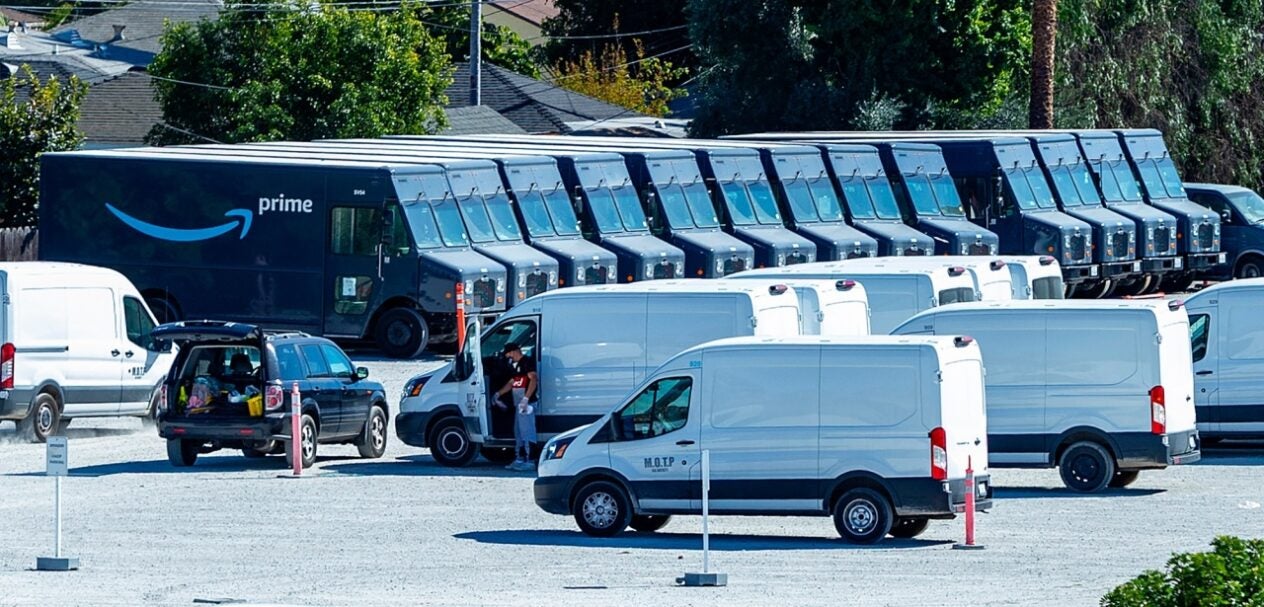Press Releases
West Covina Residents, Environmental Groups, Teamsters Settle Lawsuit with Developer Over Proposed Amazon Project

(WEST COVINA, Calif.) – A coalition of West Covina residents, environmental justice groups and the Teamsters has settled a lawsuit regarding the proposed last-mile parcel delivery operation that the City Council approved in November for the former site of Faith Church at 1211 E. Badillo Street. The site’s developer, Greenlaw Partners, has agreed to undertake additional measures to address the coalition’s zoning and environmental concerns, including but not limited to:
- A commitment to the goals of attaining 100 percent renewable energy for operations within the structure by the year 2025; utilizing all-electric, zero-emissions off-road vehicles and equipment on-site by 2025 and attaining net-zero emissions by 2030 for entire operations, with interim goals of 33 percent net-zero by 2025 and 66 percent net-zero by 2027, to the extent commercially feasible;
- Installation of solar panels and electric vehicle charging stations on the project site, as well as subsidizing the purchase of electric vehicles for employees;
- Additional traffic mitigation to encourage the use of shared and alternative transportation options;
- Compliance with lighting standards and the use of green buffers and landscaping to minimize noise and sound impacts on neighboring residences; and
- Limiting nighttime use of parking spaces near the adjacent residences.
While the coalition is celebrating these significant commitments, it’s calling on the City of West Covina and other cities throughout the state to take a stronger stand to defend communities when it comes to warehousing developments.
“The City of West Covina really abdicated its responsibility to protect residents on this project, and our settlement is proof of that,” said Shahrzad Shishegar, a West Covina resident and one of the coalition’s petitioners. “The city should have required what we achieved in this settlement and more, as other cities have on similar projects.”
Other California cities such as Riverside and Colton have instituted warehouse development moratoria, while others like San Bernardino have considered similar measures. This month, San Francisco introduced legislation that would place an 18-month moratorium on parcel delivery facilities in the city. Cities like Oceanside and Hayward have rejected proposed developments and put strict use conditions into their approvals. Cities such as Gilroy ensured full compliance with the California Environmental Quality Act (CEQA) by requiring a full Environmental Impact Report (EIR) instead of simply issuing a Mitigated Negative Declaration (MND) claiming that the warehouse will have negligible environmental impacts.
“Many cities are finally waking up to their obligations to protect our communities,” said Andrea Vidaurre of People’s Collective for Environmental Justice. “CEQA and local zoning regulations only protect us when our government officials choose to follow and enforce the law. Sure, we have the right to take legal action, but our elected officials can and should go much further given the massive impacts we see, especially with these types of warehouse developments.”
“These types of developments have devastating impacts on working-class communities when our elected leaders refuse to negotiate the right terms,” said Ron Herrera, Secretary-Treasurer of Teamsters Local 396. “Our members both live in many of the communities most impacted by warehousing developments and work in this industry, so they’re basically impacted 24/7. While the developer’s commitments here are substantial, our elected leaders have to do much better in municipalities throughout the state.”
Greenlaw’s original proposal to the City of West Covina included an already executed lease with Amazon as the operator of the proposed facility. At this point, it is undetermined whether Greenlaw will continue its agreement with Amazon and adjust terms or work with another company to operate the proposed facility.
“It is time for elected officials, developers and logistics companies to start working with impacted residents and community organizations to build a sustainable and resilient supply chain in California,” said Randy Korgan, Secretary-Treasurer of Teamsters Local 1932. “The logistics industry is expanding exponentially and making record profits while working-class communities deal with increasing pollution, warehouses closer to schools and residences, and the proliferation of jobs that don’t provide for a decent living. This race to the bottom has got to end.”